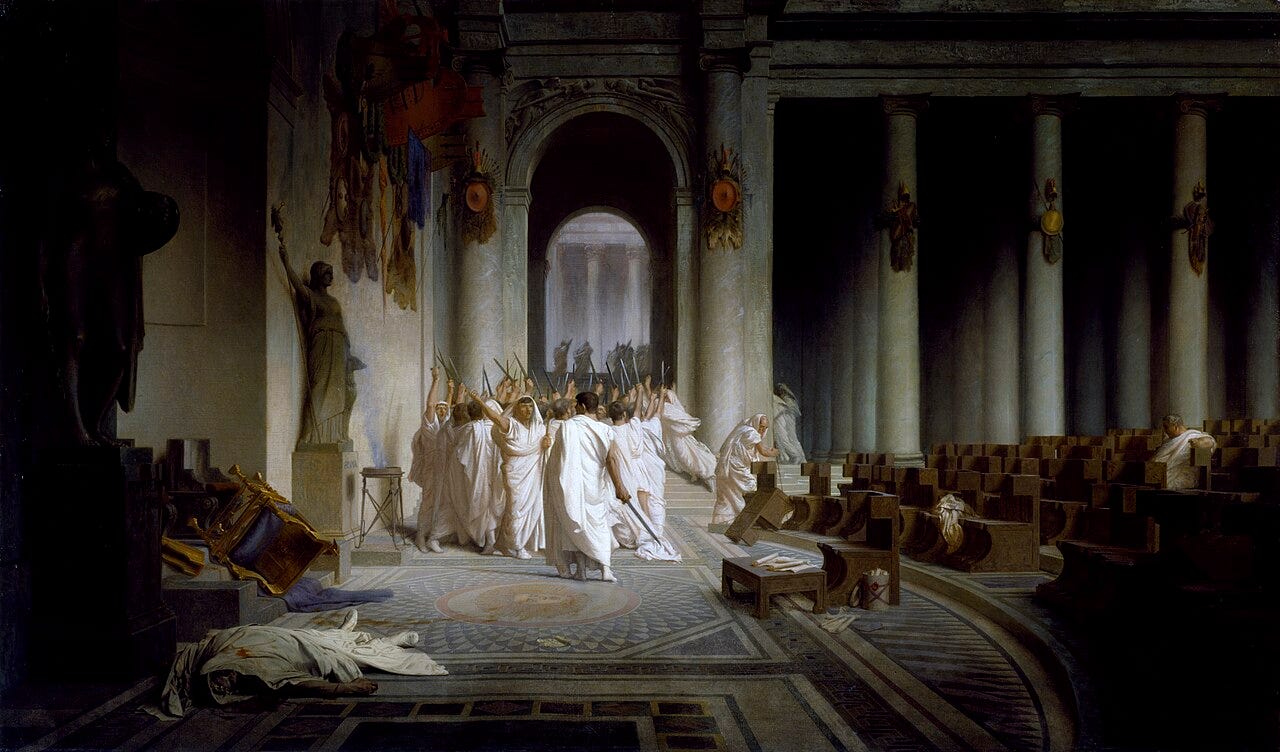Arbitrary Power Is a Threat
Republicans have always been right. (Well, small-r republicans.)
The last couple weeks have not been very fun. (That may be an understatement.)
Jamelle Bouie, of New York Times and short form video fame, posted on Thursday that Trump’s second term behavior has only drawn him closer to the “republican” tradition:
Personally though, even though I’ve thought for a while that a reappraisal of virtù is overdue, I think recent events are a more striking impetus for a re-evaluation of the republican concept of arbitrary power.
Here’s an illustrative excerpt from Philip Pettit’s seminal paper “Freedom as Antipower”:
“Under the conception of freedom as antipower, I am free to the degree that no human being has the power to interfere with me: to the extent that no one else is my master, even if I lack the will or the wisdom required for achieving self-mastery” (578).
This aspect of republican thought is fairly obvious in the Declaration of Independence’s discussion of “when a long train of abuses and usurpations, pursuing invariably the same Object evinces a design to reduce them under absolute Despotism.”
But it’s also the clear throughline in Thomas Paine’s Common Sense. When Paine writes that “the rich are in general slaves to fear, and submit to courtly power with the trembling duplicity of a spaniel” and decries that the king has “such a thirst for arbitrary power,” a republican aversion is the motive force behind his quill.
This fear of arbitrary power is in part why a major goal of most any union contract is moving away from at-will employment to just cause. And it’s why one of the books I bought last month on my bimonthly trip to scoop up most anything related to American labor relations was titled Steel-Dictator.
Certain neo-republican theorists often section these “economic decisions” off from what they consider arbitrary power. For instance, Robert S. Taylor wrote an interesting article in APSR arguing that “the proper republican attitude toward competitive markets is celebratory.” Pettit claims that a dominating party “cannot just be a system, or network, or whatever,” and despite republicans’ oft debated coolness towards markets, Taylor’s interpretation of Pettit’s view is hardly without merit.
But as I’ve touched on previously, socialist theorists like Alex Gourevitch and William Clare Roberts have in their work focused on the economy and private ownership of capital as major founts of arbitrary power and unfreedom.
Note the conclusion to chapter 6 of Capital Vol. I: “He, who before was the money-owner, now strides in front as capitalist; the possessor of labour-power follows as his labourer. The one with an air of importance, smirking, intent on business; the other, timid and holding back, like one who is bringing his own hide to market and has nothing to expect but — a hiding.”
While I am personally sympathetic to this expansion of republican principles to the economy, and should probably reread Roberts’ book Marx’s Inferno at some point, arbitrary power is most widely and consistently viewed as a critique of specific, usually public, actors. And this interpretation is more than sufficient for a critique of the second Trump admin.
In the collection Republicanism and Political Theory, Quentin Skinner explains that circa the English civil wars, the main concern was that “by emphasizing its prerogative rights, the crown was laying claim to a form of discretionary and hence arbitrary power that gave it the means to undermine specific rights and liberties with impunity.”
Skinner’s recounting of the English republicans’ concerns is a remarkably apt description of events these past two weeks. Since Trump swore for the second time that he would “to the best of my ability, preserve, protect and defend the Constitution of the United States,” he has been utilizing the traditional deference given to the president to run rampant over the Constitution (by attacking the clear and specific meaning of the 14th Amendment) and Congress (by refusing to spend Congressionally appropriated funds).
Winning the presidency, in the mind of Trump and the conservative apparatchiks that collect checks from the Heritage Institute and Claremont Institute for their work justifying Trump’s whims, means the ability, the power, to run about yanking the wires out of the walls. To put a pause on millions of people’s access to lifesaving medicine. To shut down vital programs like Medicaid seemingly on a late night whim.
As Bouie highlighted in one of his recent columns, in 2019 Trump declared that he has “an Article II, where I have the right to do whatever I want as president.” Now, 5 years later, unitary executive theory, while not identified as such, is being used to justify Trump’s attempts at impoundment and, presumably, Musk’s mucking around with the heart of the American fiscal system.
And the nation’s billionaires, from Bezos to Zuckerberg to L.A. Times owner Patrick Soon-Shiong have all been “slaves to fear, and submit to courtly power with the trembling duplicity of a spaniel,” just as Paine wrote almost 250 years ago.
The second Trump administration’s primary project thus far has been gathering arbitrary power for itself, the ability to interfere with every aspect of American and international life at their own discretion. Centuries of republican thought provide both the cipher and a playbook for how to respond.
Here are the best articles that have been published since my PEPFAR piece:
Vittoria Elliott writing about the kids running “DOGE” for Wired
Jamelle Bouie on the OMB memo madness for the New York Times
Nathan Tankus on the Treasury crisis for his site Notes on the Crises
This Harris and Rogan focused excerpt of Jonathan Allen and Amie Parnes’ forthcoming book published by NBC News
And the interview of Zohran Mamdani by the “New York Editorial Board”
What I’ve written and had published recently:
A somewhat hefty article on the shockwaves of the attempted federal funding pause in Alabama
And the books I’m reading (for fun) at the moment:
Honoré de Balzac’s Droll Stories
Upton Sinclair’s The Jungle


